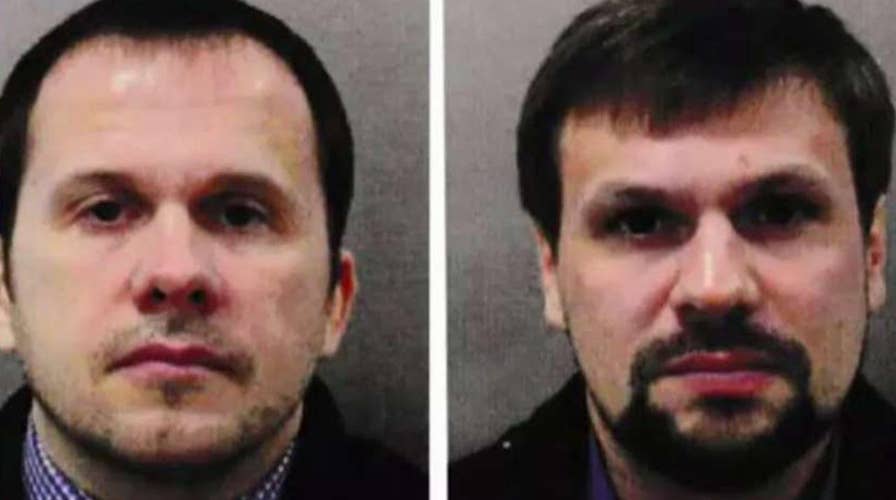Two Russians charged in nerve agent poisoning
British authorities charge two Russian men with attempted murder over the poisoning of an ex-spy and his daughter.
An ex-Russian spy and his adult daughter were critically injured after they were poisoned by a nerve agent back in March — and now Russia is paying for the attack.
Sergei Skripal, 66, and his 33-year-old daughter Yulia were found unconscious March 4 on a bench in a shopping mall in Salisbury, about 90 miles west of London. The pair were released from the hospital two months later and moved to a private, secure location.
On Aug. 8, the U.S. announced it was imposing sanctions on Russia for using a chemical weapon in violation of international law, though the Kremlin repeatedly denied involvement. Following a 15-day congressional notification period, the sanctions took effect on or around Aug. 22, according to a statement from the State Department.
British Prime Minister Theresa May said days after the poisoning that it was “highly likely” Russia was responsible. And the U.S., Germany and France all appeared to back her.
Since the March attack, a British couple with no ties to Russia have also been poisoned by the substance in Salisbury.
Dawn Sturgess, 44, died more than a week after authorities believe she was exposed to Novichok — the military-grade nerve agent also used in an attempt to assasinate Skripal. Charlie Rowley, 45, was also exposed to the agent and remains in critical but stable condition.
On Sept. 5, authorities in Britain charged two Russian men, identified as Alexander Petrov and Ruslan Boshirov, with the poisoning of Skripal and his daughter, as well as Sturgess.
The nerve agent used to poison the Skripals was smuggled to Britain in a counterfeit Nina Ricci perfume bottle and applied to the front door of their house, according to Metropolitan Police. Police believe the couple later found that same bottle, thus exposing them to the toxic nerve agent.
Here’s what we know about Skripal, and the incident that nearly killed him.
His background as a spy
Skripal served with Russia’s military intelligence, often known by its Russian-language acronym GRU, and retired in 1999. He then worked at the Foreign Ministry until 2003, and later became involved in business.
Skripal was arrested in 2004 in Moscow and later confessed to having been recruited by British intelligence in 1995. He also said at the time that he provided information about GRU agents in Europe, receiving over $100,000 in return.
WHAT'S THE GRU, RUSSIA'S MILITARY INTELLIGENCE AGENCY? 3 THINGS TO KNOW
At the time of Skripal’s trial, the Russian media quoted the FSB domestic security agency as saying that the damage from his activities could be compared to harm inflicted by Oleg Penkovsky, a GRU colonel who spied for the United States and Britain. Penkovsky was executed in 1963.
In 2006, Skripal was convicted on charges of spying for Britain and sentenced to 13 years. However, he later was pardoned and released from custody in July 2010 as part of a U.S.-Russian spy swap, which followed the exposure of a ring of Russian sleeper agents in the U.S.
Skripal’s wife and son have both died in recent years.
Prior to his wife’s death, however, she reportedly told police she feared for her husband’s life, the New York Daily News reported.
How world leaders responded to the attack
On March 15, world leaders said in a joint statement they "abhor" the attack against Skripal.
"It is an assault on U.K. sovereignty and any such use by a State party is a clear violation of the Chemical Weapons Convention and a breach of international law. It threatens the security of us all,” the statement, signed by British Prime Minister Theresa May, President Donald Trump, French President Emmanuel Macron and German Chancellor Angela Merkel, read.
The leaders called on Russia to "live up to its responsibilities as a member of the UN Security Council to uphold international peace and security."
May had given Russia until midnight on March 13 to respond to the charges. When Moscow failed to respond, May expelled 23 Russian diplomats from the U.K. They were given a week to pack their belongings and head back to Russia.
“This will be the single biggest expulsion for over 30 years and it will reflect the fact that this is not the first time the Russian state has acted against our country," May said at the time.
The U.S. also ordered 60 Russian diplomats to leave and announced it would close the Russian consulate in Seattle. In response, Russia then said it would expel 60 U.S. diplomats and close the U.S. consulate in St. Petersburg.
Two dozen countries, including the U.S., ordered more than 150 Russian diplomats out within a one-week span in a show of solidarity with the U.K.
How Russia reacted to the allegations
On March 18, Russian President Vladimir Putin said Moscow would cooperate with the U.K. in an investigation of the poisonings, calling them a "tragedy." However, Putin said if the claims they were poisoned by the Soviet-designed nerve agent were true, the victims would've died instantly.
"Russia does not have such [nerve] agents," Putin said, according to The Guardian. "We destroyed all our chemical weapons under the supervision of international organizations and we did it first, unlike some of our partners who promised to do it, but unfortunately did not keep their promises.”
Putin added that he thought "any sensible person would understand that it would be rubbish, drivel, nonsense, for Russia to embark on such an escapade on the eve of a presidential election."
Putin's remarks came after Russia earlier retaliated against the U.K.: Moscow announced March 17 that it also would expel 23 British diplomats, among other diplomatic measures.
Fox News' Travis Fedschun, Zoe Szathmary, Madeline Farber, Kathleen Joyce and The Associated Press contributed to this report.

